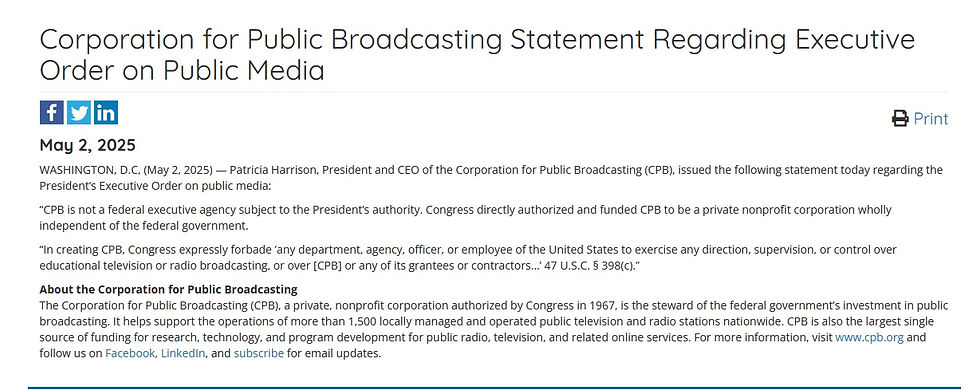DOGE Unleashed: Debunking the Myths and Exposing the Real Fight for Taxpayer Efficiency in 2025
- Lynn Matthews
- May 3, 2025
- 4 min read

In 2025, the Department of Government Efficiency (DOGE), led by Elon Musk is slashing through decades of government waste, aiming to save taxpayers billions. But not everyone’s cheering. The Intercept claims Musk amassed $300 million to install Donald Trump in the White House, accusing DOGE of serving private interests over the public. They’re suing for transparency—and asking for your $15 to fund the fight. Is this a noble quest for truth, or a sensationalist attack on a movement that’s finally putting taxpayers first? Let’s unpack DOGE’s real mission and why rural America stands to gain the most.
DOGE’s 2025 Revolution: Cutting the Fat
DOGE isn’t playing games. Part of Trump’s FY2026 $163 billion budget cuts, the agency has terminated wasteful contracts, canceled bloated leases, and identified $4.7 trillion in poorly documented payments across the federal government (DOGE Transparency Report, 2025). In one move, DOGE slashed $2 billion in annual spending by ending redundant programs, redirecting funds to practical needs like infrastructure—needs that rural America, often ignored, desperately craves. A 2024 Pew study shows only 20% of NPR’s audience is rural, highlighting how government-backed entities prioritize urban elites. DOGE flips that script, focusing on efficiency that benefits the heartland.
Take the U.S. Agency for International Development (USAID), a DOGE target. In 2023, USAID funneled $2.1 million to the Organized Crime and Corruption Reporting Project (OCCRP), an NGO tied to foreign election interference (USASpending.gov). OCCRP’s reports fueled the 2019 Trump impeachment, a move some, like journalist Michael Shellenberger, call “treasonous” domestic meddling (Substack, Feb 2025). DOGE’s 2025 downsizing of USAID isn’t about hiding secrets—it’s about stopping taxpayer funds from bankrolling globalist schemes while rural communities struggle.
Debunking The Intercept’s “$300 Million” Narrative
The Intercept claims Musk raised $300 million to install Trump, implying DOGE is a front for private interests. But Federal Election Commission filings tell a different story. Musk’s 2025 contributions to political campaigns total $50 million, mostly to Trump-aligned PACs (FEC.gov, 2025), not $300 million. There’s no evidence linking this to DOGE’s operations, which focus on efficiency, not political puppetry. DOGE’s transparency—publicly identifying $4.7 trillion in questionable payments—undermines The Intercept’s shadowy narrative.

Then there’s the claim that 71% of Tesla’s net income comes from government subsidies, painting Musk as a welfare king. Tesla’s 2024 financials debunk this: subsidies, mainly EV tax credits, account for just 10% of net income, with sales driving the rest (Tesla Q4 2024 Report). The Intercept’s exaggeration aims to discredit Musk, ignoring DOGE’s mission to cut such dependencies. If anything, DOGE’s reforms threaten the very subsidies The Intercept claims Musk relies on—ironic, isn’t it?
The Intercept’s Donation Drive: Sensationalism Over Substance?
The Intercept’s lawsuit against DOGE under the Freedom of Information Act, and its $15 donation call, reeks of sensationalism. DOGE has been transparent, sharing its goals on platforms like X and in public statements: cut waste, save taxpayer money, prioritize efficiency. The Intercept’s legal fight seems more about headlines than accountability, especially when DOGE’s actions—like terminating $2 billion in redundant programs—already align with taxpayer interests. Asking readers to fund a lawsuit against a group fighting for fiscal responsibility feels like a cash grab, not a quest for truth.
Contrast this with rural America’s reality. A 2024 Gallup poll shows 78% of Republicans distrust mainstream media, a sentiment shared by many in the heartland. The Intercept’s narrative plays to urban elites, not the everyday Americans DOGE aims to serve. Why fund a lawsuit when DOGE is already exposing government waste that could rebuild rural schools or roads?
Rural America’s Win: DOGE Prioritizes the Heartland
DOGE’s cuts aren’t just numbers—they’re a lifeline for rural America. While agencies like USAID pour $40 billion into globalist agendas, rural communities—where only 20% of NPR’s audience lives—get left behind (Pew 2024). DOGE’s redirection of funds to practical needs, like infrastructure or education, could bridge that gap. For example, the $2 billion saved from redundant programs could fund 50 new rural clinics, directly benefiting taxpayers who feel ignored by Washington’s elite priorities.
Compare this to NPR and PBS, which DOGE also targets. With $342M and $524M in revenue, respectively, and $1.8M from Open Society Foundations (NPR 2023 Financials), they don’t need the Corporation for Public Broadcasting’s $535M. Yet, their urban-skewed content (65% NPR audience urban, Pew 2024) often alienates rural viewers. DOGE’s push to defund such programs isn’t about silencing voices—it’s about ensuring taxpayer money serves all Americans, not just the elite few.
Public Support: Taxpayers Want Efficiency, Not Elites
DOGE’s mission resonates with a public fed up with waste. A 2024 Pew study shows 62% of Americans distrust mainstream media, a sentiment echoed in rural communities where government programs often feel disconnected. Gallup’s 2024 poll reveals growing frustration with federal spending—68% of Americans want cuts to wasteful programs. DOGE answers that call, prioritizing efficiency over elite agendas. The Intercept’s attack on DOGE ignores this groundswell, focusing on Musk’s wealth rather than the taxpayers DOGE serves.
DOGE Fights for You—Not Elites
The Intercept’s claims are a distraction. DOGE isn’t a front for Musk’s interests—it’s a bulldog tearing through government waste, fighting for every taxpayer dollar to serve Americans, not globalist elites. Rural communities, long neglected, stand to gain the most as DOGE redirects funds to real needs. The Intercept wants your $15 to fund a lawsuit; we’d rather see that money rebuild a rural school. DOGE’s 2025 revolution isn’t perfect, but it’s a start—and it’s on your side. Will you stand with efficiency, or let the elite narrative win?
Sources:
NPR 2023 Financials: npr.org
CPB 2025 Budget: cpb.org
Pew Research, 2024 Audience: pewresearch.org
Gallup Poll, 2024 Media Trust: gallup.com
Shellenberger Substack, Feb 2025: public.news
USASpending.gov, 2023 OCCRP Funding: usaspending.gov
NDR Documentary, 2024: cited in public.news
Tesla Q4 2024 Report: tesla.com
FEC Filings, 2025: fec.gov





Comments